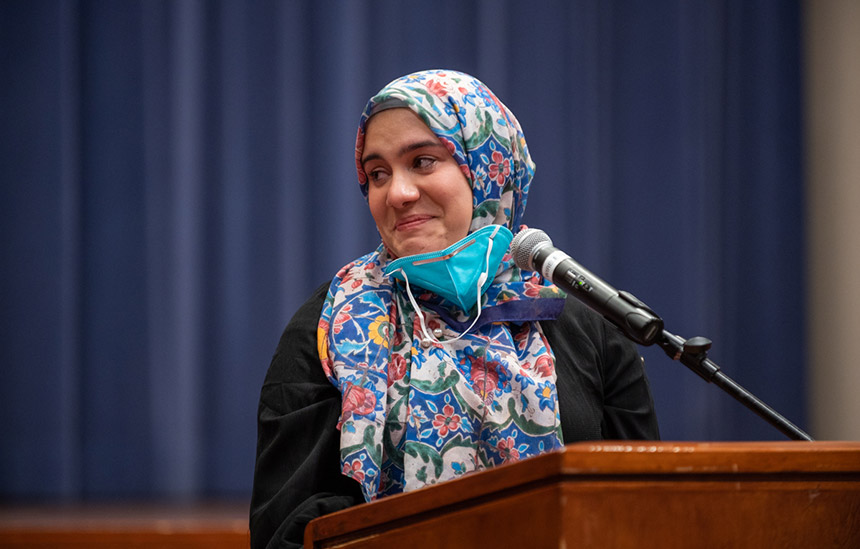
By Andrew Cohen and Sarah Weld
Fervent public service work is a staple of the Berkeley Law community — more than 95% of J.D. students take part in pro bono projects before graduating, faculty lend their expertise to wide-ranging cases, and alumni supervise student initiatives on top of their own volunteer efforts.
Every year, the school honors those whose dogged pursuit of justice for disadvantaged people and populations stood out. Here are this year’s winners, recently recognized at the annual public interest and pro bono graduation ceremony.
Pro Bono Champion Award (given to graduating students who best exemplify a commitment to and the values of pro bono work):
Gabrielle Birog ’23, Amanda Chang ’23, Taliah Mirmalek ’23, and Myka Yamasaki ’23
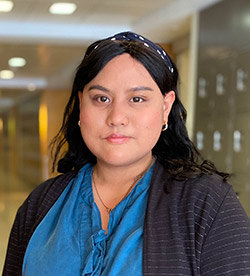
Birog, who came to Berkeley Law partly for the chance to engage in pro bono work right away, says her vast pro bono work helped remind her why she came to law school. She worked on disability rights issues in several capacities, including leading the school’s Disability Rights Project. With Disability Rights California’s Youth Advocacy Project, Birog helped people with mental health disabilities and co-developed a guide for disability justice practitioners. She also co-led the Gun Violence Prevention Project and chaired the Coalition for Diversity’s 2022 For People of Color conference, planning and facilitating the all-day event.
Birog says: “I am forever grateful to the Berkeley Law Pro Bono Program for not only allowing me to take what I was learning from the classroom and putting it into practice, but also reminding me of why I came to law school in the first place — to advocate for the rights and liberties of people with disabilities.”
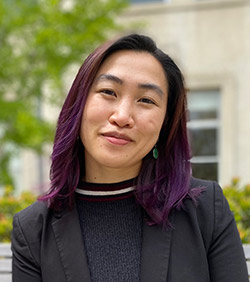
Chang has been a consistent advocate and source of encouragement for other students involved in public interest work. Hailed for building community, creating safe spaces, and giving candid advice, she took part in the Berkeley Law Alternative Service Trip (BLAST) virtual Hawaii project and the La Alianza Workers’ and Tenants’ Rights Clinic. Chang later led the school’s first in-person Hawaii BLAST trip and was co-student director of the full BLAST program. Also co-leader of the Free the Land Project, which supports environmental justice groups, Chang helped start the student-led project from scratch. Chang’s dog Kuzco also became an unofficial mascot for many student groups.
Chang says: “You don’t have to be a lawyer to advocate and organize for marginalized communities, but if you’re going to enter the legal profession and gain the power and privileges that come with it, apathy is not an option whether or not you’re directly involved in community work because decisions and arguments you make will impact and influence the legal landscape in ways that will have consequences for the most vulnerable.”
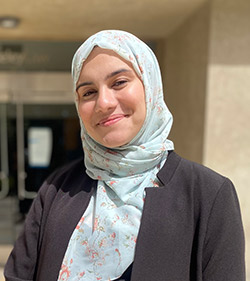
Mirmalek engaged in pro bono work every semester. She helped the Workers’ and Tenants’ Rights Clinic and virtual Kentucky BLAST trip and co-founded Law Students for Radical Real Estate, which supports the Sustainable Economies Law Center’s outreach efforts with various groups to create alternatives to extractive capitalism. Mirmalek also co-founded the Free the Land Project, took part in the Afghanistan Humanitarian Parole Project, participated in the Berkeley Abolitionist Lawyering Project, and helped drive many independent initiatives to support legal service providers, train law students across the country, and expand the pro bono pipeline.
Mirmalek says: “Without the pro bono opportunities at Berkeley Law, my study of the law would have felt incomplete; in a legal system plagued with injustice and built on land theft and enslavement, I drew energy from moments when I could work with grassroots organizations that have strategically identified the areas and ways the law can be a tool to help fight off injustice.”
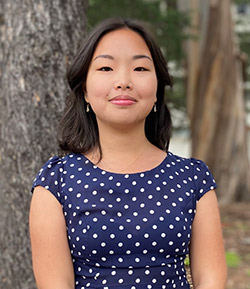
Yamasaki worked with the Berkeley Immigration Group, advising detained immigrants and their family members, drafting release requests, and fundraising for immigrant bond funds. She later co-led the group, starting two projects with lawyers at the Public Law Center and Centro Legal de la Raza. Like Chang, Yamaski co-led the Hawaii BLAST trip and co-directed the full BLAST program. She clerked for the Contra Costa Public Defender and the Alameda County Public Defender’s Clean Slate department, worked with the Death Penalty Clinic, and co-led the Womxn of Color Collective. Her pro bono contributions were honored by the Dale Minami Fellowship Committee and the Association of American Law Schools.
Yamasaki says: “I am thankful that I have had the opportunity to engage in work that critically addresses the harms of the law; attorneys and law students have a responsibility to use our privilege and power in service of marginalized people and communities.”
Brian M. Sax ’69 Prize for Excellence in Clinical Advocacy (given to a clinic student who displayed excellence in advocacy, professional judgment, collaboration, and reflection):
Meredith Huang ’23
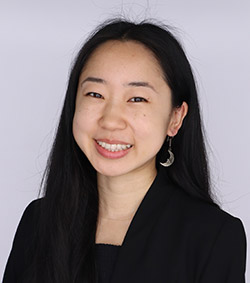
Huang was instrumental as a Policy Advocacy Clinic student in drafting and advocating for a bill eliminating juvenile fees and fines in Utah that passed unanimously out of the state senate. She also drafted policies limiting the use of fees and fines that are on track to be adopted by youth defender and district attorney’s offices. In the Death Penalty Clinic, she worked at the intersection of state and federal habeas law, including preparing for an evidentiary hearing and supporting investigation for clemency proceedings. One of her professors describes her as the “best sort of social justice advocate: she does what her clients need and follows their lead, with fierce commitment and without ego.”
Huang says: “I feel so lucky to have been a part of this joyful public-interest community — one that takes care of each other and celebrates small wins, while understanding the context: we only have work to do because cruel and unequal systems exist.”
Sax Prize Honorable Mention: Maya Fegan ’23
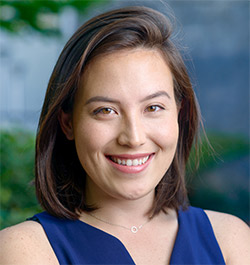
Fegan, working in the East Bay Community Law Center‘s Health and Welfare Clinic, handled wide-ranging cases on behalf of adults and children with disabilities in areas such as housing, Supplemental Security Income, Cash Assistance Program for Immigrants, and In-Home Supportive Services. She quickly became the clinic’s go-to person for cases involving clients facing mental health and cognitive challenges, and took on cases involving novel legal issues. Nominators say that Fegan, who also participated in EBCLC’s Clean Slate Clinic, “operates with deep humility, constantly reflecting on how she can improve her work,” understands the urgent nature of her client’s issues, and looks for realistic outcomes.
Fegan says: “My conversations with clinic staff and peers about law, poverty, professional ethics, and everything in between have profoundly shaped how I think about my role as a future legal aid attorney and my relationship to our clients.”
Clinical Legal Education Association Outstanding Clinical Student Award (given to one student or team that demonstrated excellence in a clinic):
Anthony Ghaly ’23
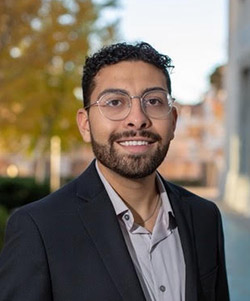
Ghaly drew on different advocacy skills in four semesters with the International Human Rights Law Clinic, from drafting a legal argument for a women-led Mexican human rights group under state surveillance to filing a United Nations human rights petition about Vietnam’s targeted repression of journalists and human rights activists. Also, he assessed global trends in the repression of human rights activists for a UN global report that will be released this summer. His nomination says he “elevates our conversation and models joyful, rigorous, analytical thinking” and calls him the “mortar that holds all of his teams together.”
Ghaly says: “Through the incredible teammates, peers, supervisors, and clients I met with every week in meetings and in seminar for the last two years, I’ve become a more effective, understanding, and informed advocate, and learned what it means to center human rights in legal practice.”
Francine Diaz Memorial Award (given to a graduating student whose studies and career plans best reflect Diaz’s commitment to social justice for women of color):
Juan Cabrales ’23, Jessica Gomez ’23, Mirmalek (see above), and Sydney Moon ’23 (also recipient of the Jim Fahey Safe Homes for Women Award, given to a graduate student with a deep commitment to combating domestic violence against women, academic excellence in relevant courses, and financial need)
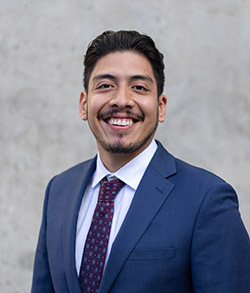
Cabrales, the son of immigrants from a low-income background, regularly saw people try to exploit his parents’ lack of immigration status, financial capital, and English fluency. Serving as a program coordinator in EBCLC’s Clean Slate Clinic inspired him to apply to Berkeley Law, where he worked with the Berkeley Immigration Group, Workers’ Rights Clinic, and International Human Rights Law Clinic. Cabrales also helped EBCLC’s Health & Welfare Clinic assist families who have children living with disabilities pursue appeals. His summer and field placement work delivered valuable experience with the ACLU of San Diego, Alameda Public Defenders, and Federal Defenders of San Diego.
Cabrales says: “My guiding principle is to help create a legal system that works for, and not against, low-income communities.”
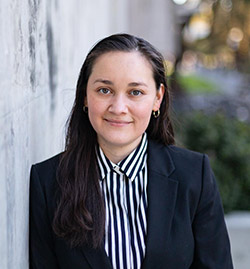
Gomez grew up seeing the criminalization of poor people of color, her parents (undocumented refugees who fled civil war in El Salvador) face discrimination and scarcity, and multiple family members arrested, incarcerated, and deported. With Berkeley Law’s Post-Conviction Advocacy Project, Contra Costa County Public Defenders, and the Los Angeles County Public Defender’s Office, Gomez helped incarcerated and formerly incarcerated clients in different phases of their cases. At the Public Defender Service for the District of Columbia and Alameda County Public Defenders, she researched whether certain convictions would result in job loss or constitute grounds for removability and inadmissibility for noncitizen clients.
Gomez says: “My work reflected the care and conscientiousness for the everlasting consequences — loss of parental rights, housing, and employment — stemming from contact with the criminal legal system, experiences that reaffirmed how the punitive legal system ruins the lives of the most marginalized people.”
Eleanor Swift Award for Public Service (given to an exceptional member of the Berkeley Law community who, like Professor Swift, has performed outstanding work to strengthen the school’s commitment to public service):
Sara Clark ’23, Huang (see above), and EBCLC Clinical Supervisor Rebecca Oyama
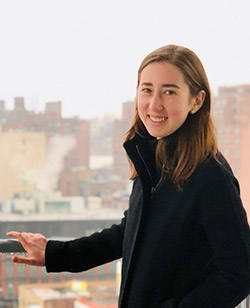
Clark served as a co-leader of the Political and Election Empowerment Project and co-president of Election Law @ Berkeley Law. Widely hailed for her stellar mentorship and guidance, she helped grow the school’s efforts to protect voting rights and democracy itself, forging partnerships with students at the Goldman School of Public Policy and co-hosting a week-long Democracy Summit with classmate Shelby Wayment ’23. Clark also was deeply committed to supporting Berkeley public interest students at large; she served on the school’s Public Interest/Public Service Career Support Committee, helping to secure $84,000 in additional summer funding for public interest students.
Clark says: “Berkeley Law’s public mission was a key reason why I chose to attend, and contributing to our community was a highlight of my time here.”
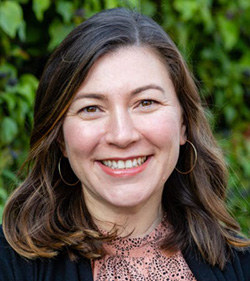
Oyama energetically helps students engage in public service legal work during and after law school, using her expertise and mentorship to expand Berkeley Law’s public service opportunities. Described as “a true treasure” whose “teaching methods are unbeatable,” by a nominating student, she teaches Policing Families, which another student calls “one of the most unequivocally important classes an American law student could take.” Supervising students in EBCLC’s Clean Slate Clinic, she empowers students to take on substantial projects and offers unrelenting support and guidance. She also helped launch the student-led Family Defense Project, training students and forging vital community partnerships.
Oyama says: “It gives me enormous satisfaction to see how Berkeley Law students I’ve encountered utilize their law school education to amplify the experiences of people and communities, disproportionately communities of color, who have been deeply harmed by our legal systems — and are already finding ways to push for urgent, fundamental systems change in their budding careers.”
Kathi Pugh ’90 Award for Exceptional Mentorship (given to outstanding supervising attorneys of Berkeley Law’s Student-Initiated Legal Services Projects for their outstanding efforts to encourage, mentor, and supervise our law students engaged in pro bono work):
Susan Beaty ’18 (Berkeley Immigration Group), Priya Patel (Berkeley Immigration Group), and Jermel Thomas (Contra Costa Reentry Project)
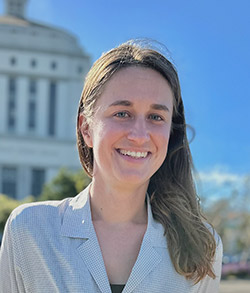
Beaty, supervising attorney at Centro Legal de la Raza, works with Berkeley Immigration Group (BIG) students to represent incarcerated noncitizens in requests to lift their immigration holds so they can return home to their families upon completing their criminal sentences, instead of being deported. Students work with clients to gather supporting evidence, including letters from family and friends, and prepare lengthy briefs describing client contributions to their communities and analyzing legal and policy rationales for release. Beaty also identified a sub-project to support clients eligible for a U-Visa, immigration relief for victims of crime. Beaty is a supportive mentor who makes herself available for frequent in-person check-ins despite a busy court schedule and large client roster.
Beaty says: “Especially as a Berkeley Law alum and former member of BIG, it’s been so rewarding to collaborate with BIG students to defend incarcerated immigrants and dismantle the prison-to-deportation pipeline, and I’m deeply honored to receive this award.”
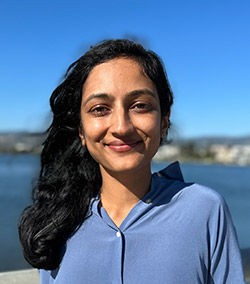
Patel, also a supervising attorney at Centro Legal de la Raza, is a deeply knowledgeable resource who has furthered BIG’s mission to provide meaningful student pro bono opportunities and help noncitizens facing detention and deportation upon their release from prison. Patel works closely with students, helping them prepare research and background materials, craft legal arguments, and advocate for their clients beyond their release requests. She has organized and presented a general immigration law training to BIG students for the past several years, and recently worked with them up until the week of her due date — finalizing a release request just days before giving birth.
Patel says: “Each year, the Berkeley students we collaborate with challenge us to think creatively about abolition and how to best serve incarcerated people, and I’m immensely grateful for the opportunity to do this work with them.”
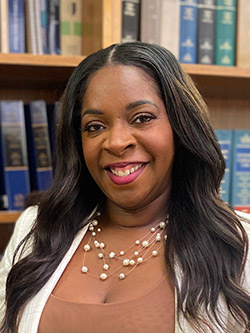
Thomas, who heads the Contra Costa Public Defender’s Office Clean Slate unit, oversees Berkeley Law students working to secure criminal record expungements, early termination of probation, reduction in charges, and other efforts to help clients overcome barriers posed by their criminal records to employment, housing, public benefits, and family reunification. Described as “a constant source of inspiration and passion,” Thomas continually reminds students that the work they do has life-changing impacts and teaches them how best to keep clients at the center of their advocacy. She also offers detailed feedback on their written work and helps them network with public defense lawyers.
Thomas says: “As law students engage in indigent criminal defense work and you’re advocating for some of the most vulnerable members of our society, your work isn’t just about upholding the law but about upholding the fundamental principles of justice and fairness — you’ve taken on a noble and important role and your efforts are essential to ensuring that the legal system works for everyone, not just those who can afford it.”
View photos of the Pro Bono and Public Interest awards event.